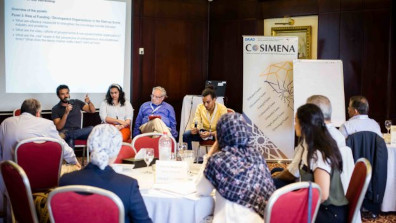Entrepreneurial Workshop and The Role of Technology Transfer Offices in Universities
The morning opened with a welcome address from Isabell Mering, the Director of the DAAD Regional Office Cairo, who presented the topic of entrepreneurship in Egypt, noting that innovation remains a buzzword of the Egyptian government’s 2030 sustainable development strategy, which believes that increasing investments in science and technology is key to sustaining growth and improving the quality of life. She then introduced the workshop as a result of numerous initiatives taken by the DAAD to connect academia and industry on technology transfer in universities, noting that Dr. Michael Stephan from the Philipps-Universität Marburg has been a frequent partner with the DAAD in cultivating and fostering innovation. She added that by building a platform that bridges academia to industry and brings decision makers and various societal and governmental stakeholders to the table, this workshop would allow startups to give feedback and suggestions on the role of universities and ways to grow this ecosystem, while bringing Germany and the MENA region into these discussions and allowing the participants to realize the possible synergies that can be created from common challenges.
Dr. Stephan started by stressing the importance of this workshop, highlighting entrepreneurship support as a key role in tackling many problems Egypt faces, including youth unemployment and economic growth. The government has responded to this call to arms, he added, noting that technology and knowledge transfer, including entrepreneurship support, has been defined as an explicit goal of Egyptian universities for six years now. Recalling back to a June 2013 DAAD conference, he noted that most higher education institutions in Egypt had just launched their own technology transfer offices and had only just begun to operate as startup support entities. Today, the startup scene has exploded in the country; at least 42 technology transfer offices (TTO) that engage in startup support have been established, with varying degrees of success, in universities across the country, according to statistics from the Ministry of Higher Education and Scientific Research (MHESR), along with several non-profit organizations, NGOs, incubators, and governmental organizations. The startup ecosystem faces a new problem, he mused: a lack of transparency. With so many players and initiatives operating in the startup support field now, the need to collaborate and share knowledge and experiences between these institutions and startup firms is an essential next step in the development process.
The first panel, which featured an interactive discussion between established TTOs and business incubators in Egyptian Universities and the MENA region, took the floor to discuss best-practice examples for the implementation of sustainable entrepreneurial strategies at higher education institutions in the region, with the goal of highlighting different approaches and methods to establish practice-oriented programs to foster entrepreneurship education.
The second panel, comprised of representatives from several Egyptian universities including Zagazig, Helwan, Alexandria, and the Egypt-Japan University of Science and Technology (E-JUST), assessed the challenges and opportunities that Egyptian universities are facing to promote entrepreneurship in Egypt while providing an interactive exchange aimed at developing strategies to overcome these challenges and cultivating new partnerships to enhance institutional capacity for entrepreneurial activities.

© Michael Assad
The final panel, made up of local entrepreneurs and industry representatives, examined the role of funding and development organizations in the Egyptian startup scene and evaluated effective measures to strengthen the knowledge transfer between industry and academia in Egypt.
Aside from the challenges in finding qualified local talent and experienced mentors, which was repeated several times as a major obstacle to technology transfer in Egypt, and the lack of adequate funding available for startups and universities alike, a common theme across the panels was the lack of structure present in the current system and the need for an entity, possibly governmental, to create a channel between universities, NGOs, and entrepreneurs to help eliminate the bureaucracy and roadblocks that these stakeholders face and to provide easy to access information about incubators, university programs, and other mentorship opportunities available to entrepreneurs. Despite the challenges that remain however, technology transfer activities and start-up support has progressed significantly over the last five years in Egypt since the first DAAD workshop in 2013. A baseline level of trust has been established between the stakeholders, a key hurdle that was highlighted in the initial DAAD conference and while there isn’t a simple success formula for start-up support, there are several best practices that we can learn from. What is essential is to create and cultivate an entrepreneurial spirit and culture not only among students, but also among the faculty members. We’ve learned that, if properly set up and managed, incubator and accelerator programmes can play a critical role and that workshop formats like summer schools and boot camps are helpful for students to learn how to work as a team and develop business models.
Report by Mr. Julian Redman
For more information on the Entrepreneurial Workshop find the detailed report and the programme here:
-
Entrepreneurial Workshop – Long Report [PDF, 686.49kb]
-
Agenda of the COSIMENA Entrepreneurial Workshop [PDF, 384.74kb]







